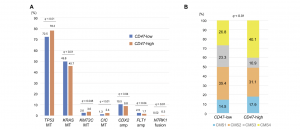In a recent study, scientists have uncovered promising evidence that targeting CD47, a protein involved in the innate immune system, could be a game-changer in treating colorectal cancer (Figure 1). This study represents one of the first attempts to focus on the innate immune system in conjunction with traditional immunotherapy, suggesting that a combined approach could yield better results for colorectal cancer patients.

Figure 1: A) Next- generation sequencing-based profiling and (B) clustering of CMS subtypes compared between CD47-high and CD47-low tumors. In (A) only alterations with a significant difference in frequency are shown. CMS, consensus molecular subtype.
Traditional immunotherapies, particularly immune checkpoint inhibitors, have revolutionized cancer treatment by helping the body’s immune system recognize and fight cancer cells more effectively. These drugs work by blocking immune checkpoints—proteins that typically prevent the immune system from attacking normal cells. Cancer cells, however, often exploit these checkpoints to evade immune detection, which immune checkpoint inhibitors aim to prevent. Historically, these therapies have focused on the adaptive immune system, the part of the immune response that develops memory and becomes stronger upon repeated exposure to specific pathogens. In contrast, the innate immune system serves as the body’s first line of defense, providing a broader, immediate response to pathogens and cellular abnormalities. Until now, it has been less explored as a therapeutic target in cancer.
This study’s focus on CD47 represents a novel approach. CD47 is a checkpoint protein within the innate immune system, allowing cancer cells to evade macrophages, a type of immune cell that identifies and destroys abnormal cells. Researchers found that colorectal cancer cells manipulate CD47 to dodge these macrophages, creating an effective shield against the innate immune response.
They analysed DNA and RNA data from over 14,000 colorectal cancer tumour samples to investigate CD47’s role further. They divided the samples into two groups based on CD47 expression levels and compared the biological differences. Their findings revealed that tumours with high CD47 expression were associated with more aggressive disease and higher oncogenic signalling, a marker of rapid tumour growth and spread. These tumours also showed alterations in immune pathways, such as suppressed macrophage activation, which allows cancer cells to persist. Another significant finding was the association between high CD47 expression and increased angiogenesis, the process by which new blood vessels form within tumours.
These findings suggest that CD47 is a powerful target for new drug development in colorectal cancer. Blocking CD47 activity could potentially stop tumour growth and improve patient outcomes. Targeting CD47 could complement existing treatment options like chemotherapy, angiogenesis inhibitors, and adaptive immune checkpoint inhibitors.
Journal article: Hiroyuki Arai et al. 2024. Role ofCD47gene expression in colorectal cancer: a comprehensive molecular profiling study, Journal for ImmunoTherapy of Cancer.
Summary by Stefan Botha
